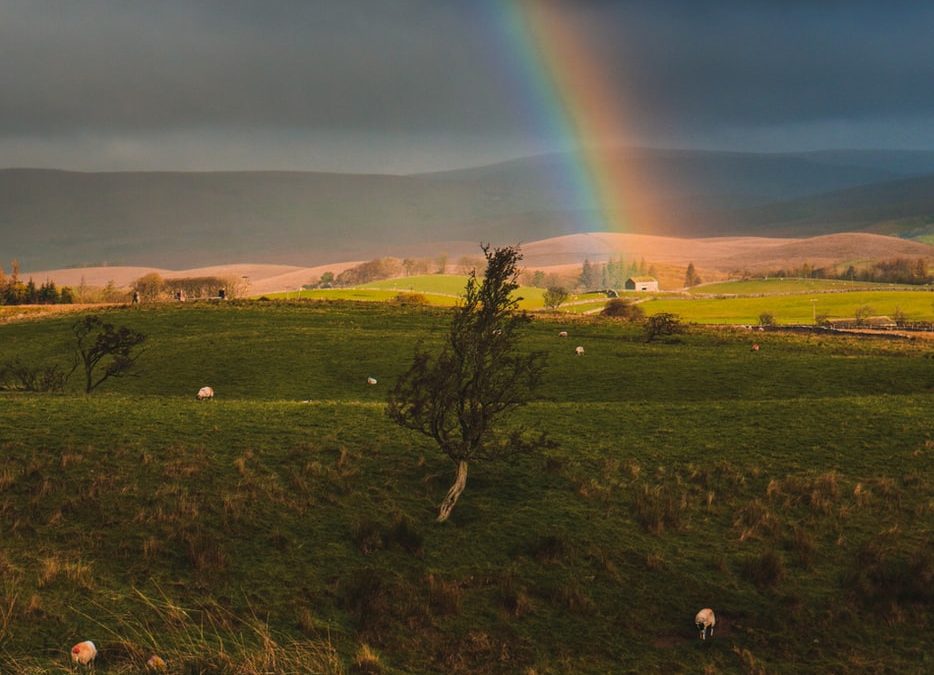Whilst walking in the Dales and coming across the window of the supposed smallest church, St Olaf’s in Wasdale, our Poet Theologian, Hannah Stone, asks us to consider whether there can only ever be one meaning to an event, text or situation. Can we practise acknowledging the possibility of error?
 Now we are allowed to drive for exercise I’m able to indulge in a weekly ‘Dales day,’ heading out of Leeds to climb hills, listen to moorland birds, relish gurgling streams, and watch the sky. Often the first verse of Psalm 121 comes into my head, so I was intrigued to learn that this very verse is engraved on a window of the supposed smallest church, St Olaf’s in Wasdale, with details of the controversy that surrounds it. Some translators have punctuated it thus:
Now we are allowed to drive for exercise I’m able to indulge in a weekly ‘Dales day,’ heading out of Leeds to climb hills, listen to moorland birds, relish gurgling streams, and watch the sky. Often the first verse of Psalm 121 comes into my head, so I was intrigued to learn that this very verse is engraved on a window of the supposed smallest church, St Olaf’s in Wasdale, with details of the controversy that surrounds it. Some translators have punctuated it thus:
‘I will lift up my eyes unto the hills, from whence comes my help.’
If you find landscapes inspiring, prompting that sense of awe and wonder associated with the holy, this is a very understandable interpretation! Others translate it differently: ‘I will lift up my eyes unto the hills. From whence comes my help?’
The answer to the question comes in verse 2 of the psalm: ‘My help comes from the Lord, who made heaven and earth.’
For a glorious version of this Psalm set by composer Herbert Howells as part of his Requiem, see this link, which also uses artwork by Stanley Spencer. Spencer’s art is deeply informed by mystical insights, and also consistently shows communities of people gathering together in the face of extraordinary events. Spencer frequently depicted neighbours from his village near the River Thames in Biblical scenes, and referred to Cookham as ‘a village in heaven’. He was considered as something of a maverick, and his interpretations of religious scenes were contentious.
It’s a long time since I studied it, but I think I am right that in the New Testament Greek, punctuation (and gaps denoting word ends) were omitted, so expertise is needed to translate accurately. But I might be wrong about that. Which brings me to another issue – is there only ever one meaning to an event, text, situation? How easy is it to admit we are mistaken? Do we embrace diversity or stick to what we know?
Radio 4’s Thinking Aloud on Wed 15th July involved experts discussing strategic ignorance and knowledge resistance – our tendency to choose to believe things which fit in with our existing prejudices, which identify with the tribe or crowd we are familiar with. I am often informed and challenged by the Advices and Queries which form the repository of teachings of the Quakers. One of them reads: ‘Do you respect that of God in everyone though it may be expressed in unfamiliar ways or be difficult to discern? …Think it possible that you may be mistaken.’ I think Spencer saw ‘that of God in everyone.’ But some people thought he was mistaken in making the art he did. It is especially hard for policy makers or public figures to admit they might be mistaken. Maybe my walking magazine is mistaken in designating St Olaf’s as smallest church. Acknowledging the possibility of error is something we can all practise (but I may be wrong about that, too!).

